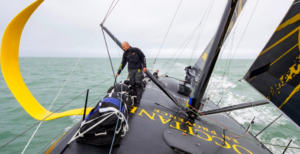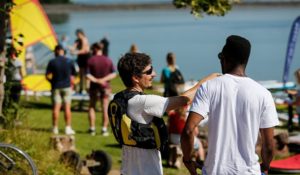‘Overlarge power-plants’ at SIBS outweigh impact of banning plastic straws

Although, as David Lewin admits, he was excited to be visiting Southampton International Boat Show, after its “last minute cruel demise last year”, his enthusiasm was tempered.
“There was a new layout with a large yacht at the entrance, the inclusion of all the new water sports and the addition of a funfair. The weather played its part as the sun shone most of the week and with the current demand for boats, no-one was going to have a bad show. Indeed some say it was the best Southampton Boat Show ever and after two years away I can believe it. It was just nice to talk to people and touch boats again,” says Lewin.
“However, as I made my way down to the pontoons to look at the boats with their transoms facing the dock I could not help but notice the size of the engines being fitted. When boats have inboard engines it’s not easy to see how big they are becoming but with the current craze for outboards it’s big and brash with the horsepower rating written boldly on the cover.
“They just seem to be getting bigger and bigger to the point of becoming absurd. Most of the motorboating in this country takes place at weekends in protected waters which often become quite crowded with most people taking their boats out for a trip to another anchorage or just across the bay. Occasionally they may go further afield but once out from behind the shelter of an island or a headland our seas can be very choppy and steep.
“Yet I believe we are condoning the installation of quite inappropriate engines for these craft. We are witnessing multiple installations of hundreds of horsepower on boats which a few years ago would be quite happy (and probably more efficient) with a single installation.
“Not only do they use inordinate amounts of petrol (gas) but for a lot of the time you simply can’t use that power because of the sea state – it’s just too uncomfortable and dangerous. Even the emergency services such as the RNLI don’t fit motors of this magnitude, efficiency to perform the task being their watchword. In fact within the Solent where I do my boating, however fast your boat is, you will only arrive 20-30 minutes ahead of a slower motorboat as you can only do 6 knots in the rivers anyway.
“Proponents of these overlarge powerplants excuse it by saying they do so few hours in the year that the emissions and carbon footprint are negligible, but that’s not the point.
“There is a climate emergency.
“We all know it and we all have a responsibility to act. It felt, standing on that dock at the show as if nothing had changed, boating had become more elitist and that there was one rule for the public at large but that it need not apply to those that could afford it.
“To my mind this trend is totally unacceptable and puts our industry yet again in jeopardy. We need to be looking for sustainability in manufacture and performance. I can agree that it’s early days in the development of alternative solutions but I saw no meaningful move or explanation by any manufacturer towards a carbon neutral future.”
Lewin is looking for meaningful leadership on industry’s approach to the environment.
“British Marine offered a prize for the most environmentally friendly stand at the show, but quite frankly the abolition of some plastic bottles and only using paper straws doesn’t do much for the future of the planet,” he says.
“We need to sell the fact that we are a responsible industry, looking forward and not just being retro-active. Maybe we need to put more effort into selling wind power – after all it’s served mankind for many thousands of years. Why is sailing still in decline? Do we actually need to travel at 40 knots? Lesser speeds offer more comfort, time to enjoy the surroundings and a lot less fuel.
“Those of us who have been around during a few fiscal cycles will know that the current boom cannot last. We have just been through an extraordinary time which always brings extraordinary responses but once the supply chain catches up, international travel resumes and some people discover boating might not be for them, the industry will be exposed to all the pressures of the new (green) normal.
“I don’t believe hanging 600 horsepower on the back of a glorified RIB sets the right tone. It may be what the customer still wants but it is fast becoming immoral in this modern world.”
David Lewin is a consultant for Global Marine Business Advisors (GMBA).
Read Lewin’s previous thought piece in Marine Industry News’ print edition. In this, Lewin explores what he terms ‘the boating arms race’.











“It felt, standing on that dock at the show as if nothing had changed, boating had become more elitist……” It’s always been elitist!
“Do we actually need to travel at 40 knots?” – Yes we do, but this could have been left as ” Do we actually need to travel……?” to which the answer is no, which then questions the whole purpose of SIBS!